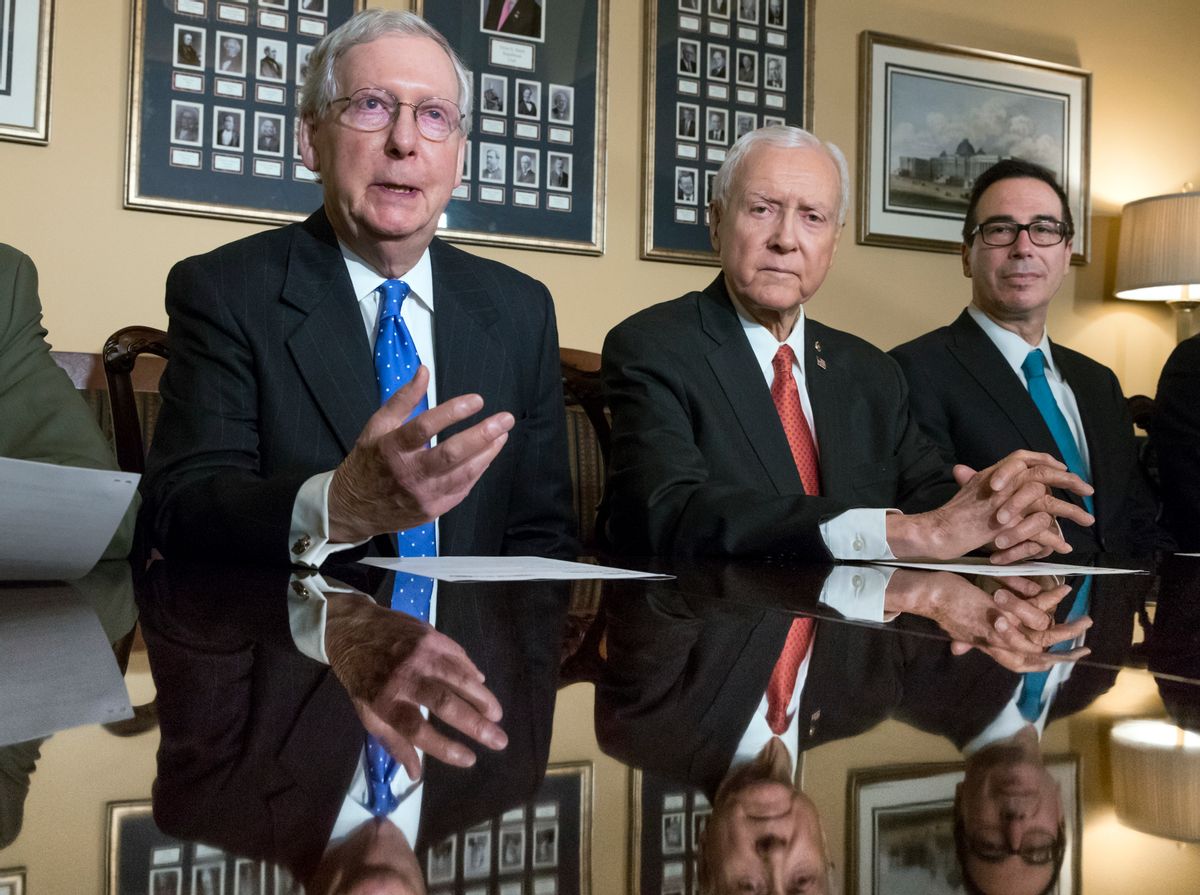The U.S. Senate on Dec. 2 passed its version of one of the most sweeping tax reform bills on a party-line vote of 51-49. After reconciliation with a House version, the bill is expected to be passed into law by the end of the year.
The process and content of the legislation is largely reminiscent of the previous efforts by Republicans to repeal the Affordable Care Act: limited hearings, limited analysis, limited participation and limited transparency. By providing various concessions, Senate Republican leadership was able to convince its three holdouts from the bill that would have gutted the Affordable Care Act from earlier this year: Republican Senators John McCain of Arizona, Lisa Murkowski of Alaska and Susan Collins of Maine. “Tax reform” essentially morphed into the functional equivalent of this summer’s “skinny repeal” version of “repeal and replace.”
As a professor of health policy, I see this “tax reform” as “health care reform” by another name. We may simply have seen the opening of the door for much more far-reaching efforts to transform American social programs over the coming years.
Effects beyond Obamacare
The most obvious effect of the Senate tax reform bill is the repeal of the individual mandate established by the Affordable Care Act. The provision required most Americans to obtain insurance coverage or pay a fine and has long been the most disliked component of the ACA.
While perhaps the least liked part of the ACA, the mandate serves as a crucial component to stabilize insurance markets around the country. It was crucial because it limited the potential for something called adverse selection, whereby only the sickest individuals, usually those with high medical costs, sign up for insurance. Without a requirement to carry insurance, and with insurers required to offer insurance to all comers, healthy individuals are likely to only sign up when they get sick if there is no mandate.
Without the requirement to purchase insurance, the Congressional Budget Office predicts that 13 million fewer Americans will have health insurance. Potentially, and equally significant, insurance markets will likely be further destabilized. Insurance companies may decide to further reduce the number of policies they offer in the insurance marketplaces, or even stop offering policies. As a result, potentially millions of Americans could be left without options to purchase insurance.
Without further actions, the bill would also trigger an automatic reduction in Medicare spending of US$500 billion over 10 years. Republicans would have to pass separate legislation, with Democratic support, to avoid this scenario.
Moreover, the Senate’s tax reform also does more subtle things, including reducing the incentives for pharmaceutical companies to develop drugs for rare disease. It also extends taxes to graduate student tuition waivers and eliminates the student loan interest deduction, both crucial for future physicians and researchers.
In the long run: Starving the beast?
However, while the effects of the legislation, if enacted, will be felt immediately, the most crucial implications may lie in the future. The tax bill is projected to add $1 trillion to the federal deficit. As a result, Republicans will likely move to cut funding to all of America’s social programs, from food stamps to Medicare and Social Security, with privatization being the final goal.
This is consistent with long-term goals of the Republican Party. Going back to the New Deal and the Great Society, large parts of the GOP have been opposed to the creation and extension of social programs like Social Security and Medicare.

Ronald Reagan Library
Yet, once enacted, the programs largely proved incredibly popular. Historically, they became virtually impossible to undo because of large popular and interest group support.
Because those programs proved impervious to frontal assault, Republicans have opted for a backdoor strategy.
First, they have sought to reduce the ability of government to raise revenues. Over time, accumulating deficits and debt would inevitably trigger the need for adjustments to either taxes or social programs.
They then could implement the second step. Figuring that Americans would be loathe to give up their tax cuts, Republicans would then be able to cut and potentially privatize even the most popular social programs.
In short, they would force reductions in social spending by reducing the ability of government to fund these programs, a strategy that has been called “starve the beast.”
The first major success using this strategy was the indexing of tax brackets in the 1970s. Previously, government tax receipts had grown implicitly as inflation pushed taxpayers into higher tax brackets. To a large degree, Democrats had not been required to raise taxes for social spending.
When indexing and cuts did not prove enough to trigger major reductions in social programs, Republicans, and many conservative Democrats, pushed through major cuts under the Reagan and Bush administrations.
Yet, Republicans had not expected the public’s reaction: Taxpayers wanted their cake and to eat it, too; taxpayers loved their reduced taxes, but the demand for social spending went unabated. The results are obvious today: Federal deficits cumulative driving the national debt above $20 trillion, or 106 percent of GDP.
Fast-forward to 2017. Republican efforts to undo the ACA have gone significantly beyond the Obama administration’s signature accomplishment and include transformational changes to the Medicaid program. Talk about privatizing Social Security and Medicare has also been common.
Republicans have not able to accomplish any of it outright. But further increasing the federal deficit may just be enough to make significant changes to our nation’s social programs. Republican leaders are doubling on down on their strategy. Starving the beast may finally work.
Health care will change
The changes to the health care of many Americans potentially ushered in by tax reform are significant and damaging. Many Americans will lose access to health insurance, costs are projected to increase and fewer individuals will be able to afford getting an education. People will be hurt.
![]() The long-term implications may be even more significant and culminate in transformational changes to American social program not seen since the 1960s. If successful, Republicans may prove successful in their long-running quest to undo the health protections the country has had since the New Deal and the Great Society.
The long-term implications may be even more significant and culminate in transformational changes to American social program not seen since the 1960s. If successful, Republicans may prove successful in their long-running quest to undo the health protections the country has had since the New Deal and the Great Society.
Simon Haeder, Assistant Professor of Political Science, West Virginia University



Shares